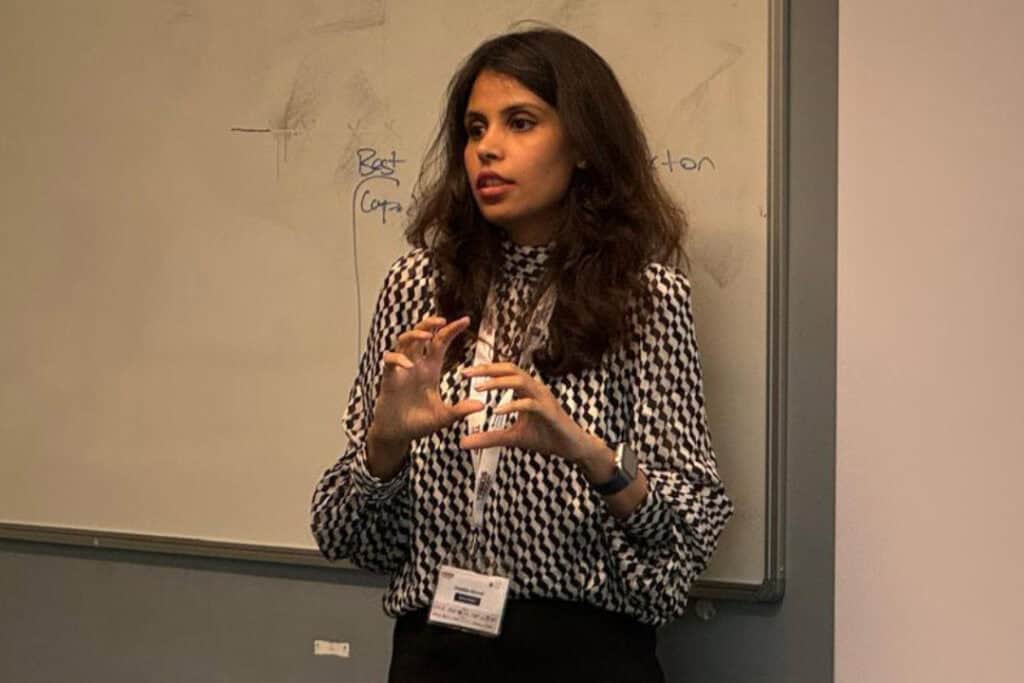Brunel University London

Oneeba Ahmed is an engineer and researcher, who is currently pursuing an RNID-funded PhD at Brunel University London.
Her research focusses on integrating robotic technology into cochlear implant surgery, to improve surgical precision and thus hearing outcomes from cochlear implantation.
More about Oneeba’s work
Oneeba has several years of experience working in industry, and has worked on complex engineering projects, gaining hands-on expertise. She wants to use her biomedical engineering skills to contribute to the development of advanced medical devices (such as cochlear implants) and technologies that enhance patient care.
Developing a robotic surgery technique for cochlear implantation
Read about Oneeba’s research projectOneeba’s approaches to hearing research
In the past decade, researchers have started to implement robotic technology in surgery, aiming for greater efficiency and precision in procedures like cochlear implantation. This is a significant advance, as modern surgical techniques increasingly rely on robotic assistance to enhance their accuracy, moving beyond the reliance on a surgeon’s experience alone.
What makes this progress truly exciting is the integration of robotics with advanced sensing technologies to provide real-time feedback during surgery. These technologies allow surgeons to make data-driven decisions, and in the case of cochlear implant surgery, this can improve the precision of electrode placement in the inner ear and ultimately lead to better hearing outcomes for patients.
Hearing research faces several key challenges, including the complexity of the hearing system, which makes it difficult to fully restore natural hearing using current technologies. While cochlear implants have advanced the field, they still provide limited sound quality, particularly in noisy environments.
Additionally, there is significant variability in outcomes, as factors like age, degree of hearing loss, and overall health impact the effectiveness of treatment.
Resource constraints, such as limited funding, further hinder the pace of research and the development of new technologies. Moreover, hearing loss often lacks awareness and is stigmatized, leading to delayed diagnosis.
I am motivated to improve the lives of those who are deaf, have hearing loss, or tinnitus because of the profound impact that hearing loss can have on someone’s quality of life. Hearing loss affects not only communication but also social interaction, emotional well-being, and cognitive health, and I believe everyone deserves the opportunity to fully engage with the world around them.
The transformative potential of advanced technologies like cochlear implants and emerging biomedical innovations fuels my passion for research. By working as a biomedical engineer, I aim to develop more effective treatments and devices that can significantly enhance the lives of people with hearing loss.
Ultimately, I am driven by a desire to restore this fundamental human sense and create meaningful change that opens new possibilities for millions of individuals worldwide.
I aspire for my research to reach and benefit individuals experiencing hearing loss. My goal is to develop cost-effective solutions that significantly enhance quality of life, ensuring that everyone has access to the tools and technologies they need to communicate effectively and engage fully with the world around them.
The RNID studentship represents a significant milestone in my academic and professional journey, providing essential support and resources to advance my research in hearing and communication. Being associated with such a respected organization underscores the importance of my work and aligns my goals with their mission to improve the lives of people with hearing loss.
This studentship not only validates my efforts but also connects me with a network of experts and fellow researchers, fostering collaboration and knowledge exchange. It empowers me to focus on developing innovative solutions that address the challenges faced by those with hearing loss, enabling me to conduct meaningful research that contributes to advancements in technologies and treatments.
Ultimately, the RNID studentship inspires me to push the boundaries of my research and reinforces my commitment to enhancing quality of life for people with hearing loss.